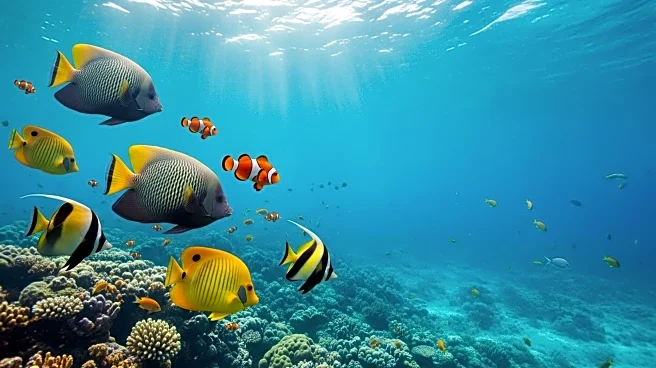What's Happening?
South Australia has implemented a ban on fish-shaped plastic soy sauce containers as part of its ongoing efforts to reduce single-use plastics. These containers, popular among sushi consumers, have been identified as particularly harmful to the environment. They are often mistaken for food by marine life and are too small to be effectively sorted by recycling machinery, leading to increased pollution. The ban, which took effect on Monday, requires restaurants to switch to larger bottles, refillable containers, or more environmentally friendly single-use alternatives such as sachets or compostable vessels. This measure is part of a broader initiative by South Australia, which has been progressively banning various plastic items since 2009, making its regulations the most comprehensive in Australia.
Why It's Important?
The ban on fish-shaped soy sauce bottles is significant as it highlights the growing global movement towards reducing plastic waste, which poses a severe threat to marine ecosystems and human health. By targeting these specific containers, South Australia aims to prevent them from entering the ocean, where they can cause harm to marine life. This initiative reflects a broader trend of governments worldwide enacting similar bans to combat plastic pollution. The move also underscores the challenges of managing single-use plastics, which are predominantly made from fossil fuels and contribute to environmental degradation. The success of such measures could influence other regions to adopt similar policies, potentially leading to a reduction in global plastic waste.
What's Next?
Following the ban on fish-shaped soy sauce bottles, South Australia plans to extend its prohibition to other plastic items, such as stickers on fresh produce, although this has been delayed due to concerns from producers about increased costs. The state's Environment Protection Authority will enforce the ban, with penalties ranging from warnings to prosecution for non-compliance. As the world grapples with the plastic pollution crisis, the effectiveness of South Australia's measures could serve as a model for other regions. Additionally, ongoing international discussions aim to establish a binding global treaty on plastic pollution, although recent talks have faced challenges.
Beyond the Headlines
The ban on fish-shaped soy sauce bottles in South Australia highlights the ethical and environmental responsibilities of reducing plastic waste. It raises awareness about the impact of seemingly innocuous items on marine life and the broader ecosystem. The initiative also reflects a cultural shift towards sustainability and the need for innovative solutions to replace single-use plastics. As more regions adopt similar measures, there could be increased pressure on manufacturers to develop biodegradable or reusable alternatives, potentially leading to significant changes in consumer behavior and industry practices.










